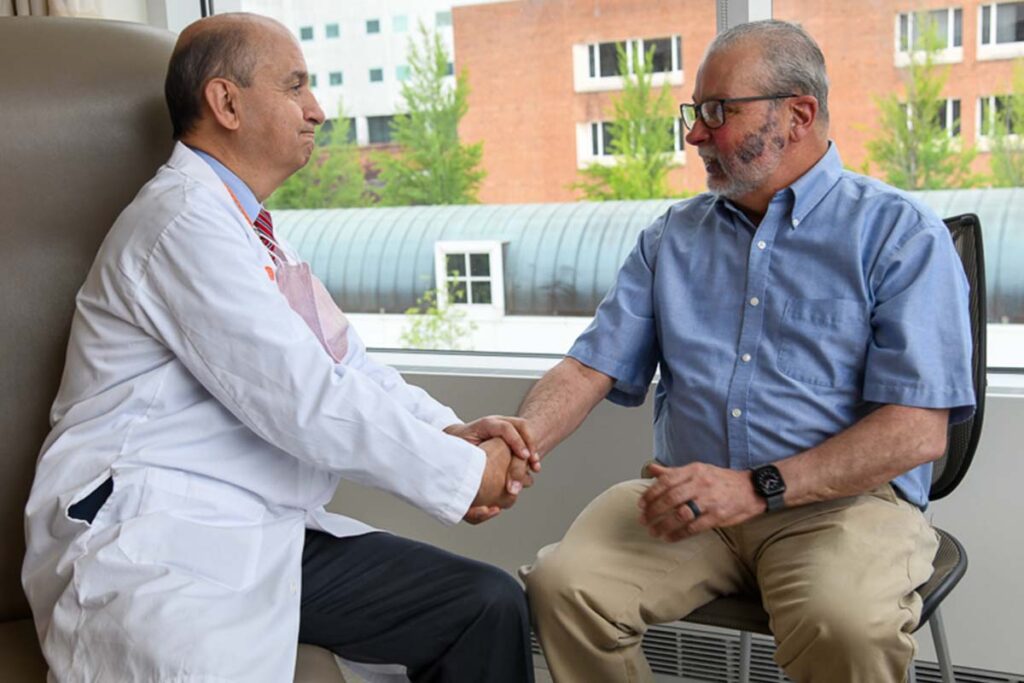When David Lunt started having difficulty typing and calculating tips last summer, he assumed they were signs of aging. Then, one afternoon in late August, things turned more serious. The side of his face began to quiver. “I couldn’t speak and my mouth was moving by itself; I had no control over it,” he recalls.
David landed in a local hospital in Williamsburg for 4 days. There, he learned the devastating news that he had stage 4 lung cancer. And it had spread to his brain. David was shocked. “I had no cough or shortness of breath,” he says. He had quit smoking nearly 3 decades ago. An avid cyclist, he’d recently been doing 15- to 25-mile rides.
Assuming he had little time left, David worked on getting affairs in order for his wife, Valerie. At the same time, his oncologist in Williamsburg focused on getting David to UVA Health. There, he found the right experts to give him more of the 2 things most limited and most precious for someone with terminal cancer — time and quality of life.
Finding Brain Metastases Experts
David had more than 30 lesions on his brain. And his symptoms were getting worse. “I thought, ‘Oh, wow, this is really coming fast,’” he says. “That was a really dark period and a period of prayer for us and for people that pray with us and for us.”
His Williamsburg oncologist knew whole brain radiation therapy could treat David’s brain metastases. But whole brain radiation is a double-edged sword. It can give patients more time with good quality of life — but it can cause neurological issues after a few months.
His oncologist wanted to know if David had better options. For that, he needed a team with specialized knowledge and expertise in cancer that’s spread to the brain, or brain metastases. David’s oncologist urged him to go to UVA Health.
A Better Treatment Means More Time
UVA Health oncologist Ryan Gentzler, MD, noticed an important detail about David’s cancer. It had a mutation seen in just a small percentage of lung cancers. Gentzler recommended a medicine to target this specific mutation.
Fadul’s reaction to the results changed David’s outlook. “Dr. Fadul was excited. He said, ‘This is miraculous.’ It was like all this great darkness I had been feeling was lifted when I saw how excited he was. He’s just been a wonderful, wonderful guide.”
Need a Second Opinion on Your Brain Metastases Treatment?
UVA Health’s specialized team can help you find the best treatment to maximize survival and quality of life.
Living Well Despite Brain Metastases
A month later, in January, David got more good news. The tumor in his lung had shrunk. And his previously enlarged lymph nodes were back to normal size.
“That was really encouraging news to read in the radiologist’s notes,” David shares. “It said to me that not only was the targeted treatment working on the lesions in my brain, it was also having a positive effect on the primary tumor in my lung.”
David’s had a few side effects from the medicine, but he’s back to cycling. He also returned to volunteering at a local organization that refurbishes and donates bicycles to people in need. Researching and valuing the bikes takes mental effort, and he’s able to handle that now.
He’ll keep getting infusions as long as he’s doing well. “I’m so glad that my oncologist worked as hard as she did to get me to UVA Health,” he says.
